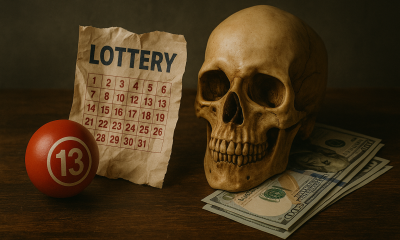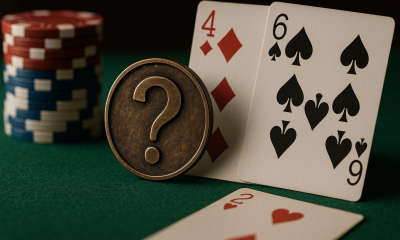Psychology
Gambler’s Remorse: The Emotional Impact of Losing

If you have played casino games or placed sports bets for money, you may have already experienced gambler’s remorse. It is a very common phenomenon to anyone who likes to gamble, and we feel it to varying degrees, from simple disappointment to extremes such as depression, anger, guilt, and other feelings associated with remorse. In most cases, players will simply shrug off the remorse, or accept their losses and carry on. But in a few instances, the damage may be too great, or the player may be too vulnerable, to get closure.
Left unattended, our remorse can be extremely damaging, and alter the way we gamble, which could have even more serious consequences. Learning about gambler’s remorse, and how you can either overcome or prevent it, is crucial to keeping your gaming fun. We also have a responsibility to learn about this phenomenon not just for ourselves, but also to protect our peers and ensure they are playing safely and responsibly.
How Losses Affect Us Emotionally
We feel the weight of loss differently, and it all depends on the scenario. Playing penny slots or games for cents does not have the same tremendous impact as losing a high stakes game. Or, if you have just sat down to play a game and lost the first three hands, you won’t feel as devastated as if you had been playing for 10 rounds and then lost three on the bounce.
Perspective is important, and it is crucial to understand how our minds react to the outcomes in any given scenario. Most often though, the most painful losses follow losing streaks.
Broken Expectations
You cannot make any assumptions when gambling, as there is no way of knowing whether you will get lucky or not. Yet we do like to build betting systems and strategies that can accommodate any possible outcome. They still do not protect you from loss, and you should always keep a realistic outlook.
Losses are part of gambling. Yet we don’t tend to think of our exploits in terms of how much we lost. Another mistake is to overestimate our chances of winning. The house always has an edge, it is the way they stay in business. The probability of winning does not change just because of what happened in previous rounds. Also, there is no such thing as a winning or losing streak. These are just patterns that some players choose to read into, but they have no influence on what will happen in the next round of a casino game.
Poorly Made Decisions
In games that have an element of control, we can directly influence the outcome of each hand. For instance, blackjack or video poker. While this does open up the opportunity to decrease the house edge and apply mathematically optimised strategies, it can also be the source of great remorse. For instance, your decision leads to you going bust in Blackjack. And then, the dealer reveals the house’s card, and it turns out you would have won if you didn’t hit.
Using a basic blackjack strategy, you will have to get used to the fact that you will, on occasion, lose. The strategy is built to improve your chances of winning, but it can’t win every hand for you. A decision that directly leads to a loss can build up a sense of remorse.

Impulsive or Reckless Behaviour
The worst case scenario is when we try to “fix” the remorse by doing something impulsive. Such as doubling up our stake and trying to win back whatever we lost. In the heat of the moment, even the most reserved player may try something reckless like this to return to square one.
But it is an extremely dangerous move, and the consequences are far worse than just losing a big sum of money. Betting recklessly with big sums of money can lead to pathological gambling. That is, betting like you have nothing left to lose. Until you literally have nothing left that you can possibly lose.
Stages of Gambler’s Remorse
Like any other kind of remorse, the emotional remorse behind losing can build in stages. First, there is the stage of shock and denial. You can’t believe that you lost your money, and will not accept the loss. This can lead to anger. Why did you lose? the game must be rigged or something is wrong with the table.
After anger, players can experience regret and guilt. They question their choices and self-control. Often, these gamers may also lose their confidence, and make poor decisions during their gaming. The last emotional stage is that of acceptance – or lack of acceptance. After going through the full cycle, some players feel like they must make changes in their behaviour. That could mean taking an extended break from gambling or giving it up altogether. Players who don’t go through the stage of acceptance may fall into cycles of chasing losses and forming habits that can ultimately wreck them financially.
How You Can Cope with Gambler’s Remorse
No player is exempt from feeling gambler’s remorse from time to time. We need to be able to handle these issues when they pop up. In the same way that we have to manage our emotions after winning big. After all, you don’t want to throw away your winnings out of the belief you can make more.
The key to curbing your emotional reaction to loss is sticking to a plan. You need to create a bankroll and organise your spending habits before playing to ensure that you will never end up overspending. It also helps players incentivise their gaming sessions. Another good habit is keeping tabs on how long you are gaming. Set reality checks to keep an eye on the clock, and take breaks to assess each session. That way, you can decide whether you want to keep playing or call it a day.

How to Prevent Gambling Addiction
The biggest danger, as we mentioned before, is not the loss you suffer today. It is in making a habit of playing recklessly with money you cannot afford to lose. A lot of gamers who feel heavy remorse will also feel loss aversion. This is when you feel losses more than your wins. Even if you make back part of the money you lose, you will not be able to take joy in those wins.
If you start to feel overwhelmed by emotions when gambling, then you should immediately take a break. You need time to acknowledge your feelings and evaluate whether these games are really worth your while or not. Fortunately, there are many institutions dedicated to gambling harm prevention, and you can reach out to them with your concerns.
You can call a professional counsellor or a gambling helpline to talk about your issues. And then, they can help you determine how to go forward with your gaming. It does not necessarily mean you need to stop altogether, but a change is needed to help you prevent falling into similar circumstances. Here are some organisations that individuals can turn to for gambling advice:
Gamble Safely and Responsibly
Most licensed online casinos will ask you to set deposit or spending limits when you sign up. The importance of these tools cannot be understated. As are reality checks, self-assessment tests and gambling addiction awareness programs.
Gambling can be a great source of entertainment, but only in good moderation. When transferring money into your gaming account, remember the following. There are no guarantees that you won’t lose your money. You may hit a big win, but you may also eat through your balance without receiving any returns.
Casinos are not financial institutions and should be treated as platforms for gaming purposes. Never play these games if you are feeling depressed or down, as there is no guarantee that they will lift your mood. Play the games for fun, and be prepared for the eventuality of losses as well as wins.











